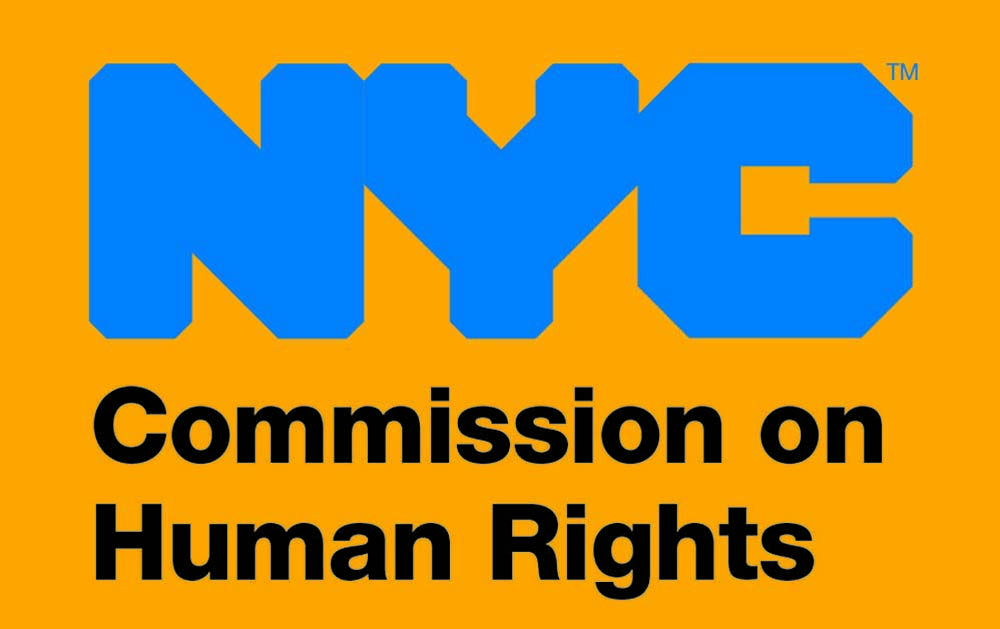Ads will appear in subways, bus shelters, LinkNYC kiosks, NYC and Taxi TV, local businesses, ethnic and community radio and newspapers in the five boroughs and across social media.
Campaign follows a more than 40 percent increase in sexual harassment claims at the Commission over the last two years.
The ads by the NYC Commission on Human Rights will run for six weeks, informing New Yorkers of their rights against sexual harassment and encourage people to report incidents to the Commission, a venue for justice that will investigate their claims.
The multilingual ad campaign follows a more than 40 percent increase in sexual harassment claims at the Commission over the last two years and is part of the City’s broader effort to ensure that New Yorkers understand their rights and report sexual and gender-based harassment to the Commission. The Commission enforces one the strongest and most extensive civil rights law in the nation, the NYC Human Rights Law, which protects New Yorkers against discrimination and harassment in employment, housing, and public accommodations, among other areas.
“In this new era of #MeToo and #TimesUp, I commend the City’s Commission on Human Rights for helping New York City stand out as a leader in the fight against sexual harassment in the workplace,” said Public Advocate Letitia James. “This ad campaign makes it clear that our City cannot and will not tolerate sexual harassment of any form, and that victims have a reliable, safe way to seek the help and justice they deserve.”
“Everyone is entitled to work in a place where they feel safe, and I applaud the NYC Commission on Human Rights for this ad campaign encouraging New Yorkers to report incidents in which their rights are violated,” said Speaker Corey Johnson. “The City Council is proud to have introduced a package of bills that address this very issue, which the #MeToo movement has shed a much-needed light on. The message is clear — New York City will not tolerate the degradation of people in the workplace.”
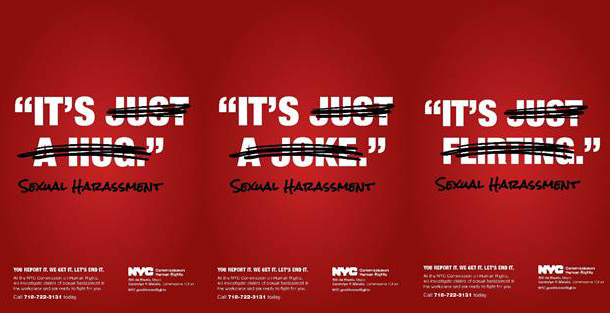
“We created this public outreach campaign to remind New Yorkers that the Commission is a venue where New Yorkers can report sexual harassment, get justice, and hold violators accountable,” said Chair and Commissioner of the NYC Commission on Human Rights, Carmelyn P. Malalis. “At the Commission, we understand that many victims may hesitate to report sexual harassment given the imbalance of power in the workplace. Many victims fear retaliation, damaging their careers, or worse, that they won’t be believed. We want to assure New Yorkers that the Commission takes every claim of sexual harassment seriously and investigates claims to get justice for victims. We encourage victims to come forward and report sexual harassment to the Commission so we can help put an end to it. No one should suffer sexual or gender-based harassment in the workplace, not now, not ever.”
Sexual harassment protections under the NYC Human Rights Law are among the strongest in the nation and are interpreted far more broadly than federal law. Federal courts have required that sexual harassment be “severe or pervasive” to be unlawful, whereas the NYC Human Rights protects against any unwanted sexual behavior such as sexual comments, jokes, gestures, touching, texts, or emails that create a hostile or offensive work environment.
The ads highlight three common phrases perpetrators may use to excuse sexual harassment in the workplace, including “It’s just a joke,” “It’s just a hug,” and “It’s just flirting,” and exposes these unwanted actions for what they are — sexual harassment. Since reports of sexual harassment are often dismissed or minimized in the workplace, the ads remind New Yorkers that the Commission recognizes these actions as sexual harassment and encourages them to report it to the Commission by calling 718-722-3131.
Victims of sexual harassment in New York City may file claims at the Commission even when they are bound by arbitration agreements that prevent them from filing cases in court. Independent contractors, interns, and volunteers, whether paid or unpaid, are also protected under the City Human Rights Law.
Campaign ads will appear in English and Spanish in nearly 5,000 placements citywide over the next six weeks, including on subway cars and stations, bus shelters, LinkNYC kiosks, and in nail salons, barber shops, and bars. The ads will also appear in 24 ethnic and community newspapers in English, Spanish, Chinese, Korean, Arabic, Bengali, Russian, and Haitian Creole, including in El Diario, World Journal, Carib News, Allewaa Al-Arabi, Amsterdam News, Weekly Bangalee, and Gay City News, among others. Digital campaign ads will run on Facebook, Instagram, Twitter, Google, as well as on several online publications, including New York Magazine, Jezebel, and Bklyner.
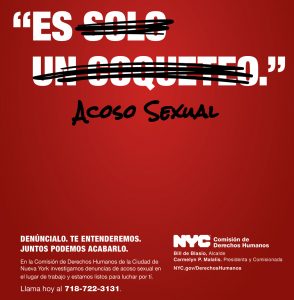
The Commission will also launch a series of short films on Facebook, Taxi TV, and NYC TV later this month as part of the campaign. The short films, which were inspired by a letter the Commission received detailing the impact of sexual harassment on a family, were produced for the Commission by Adrienne Becker, CEO of Killer Content, an industry leader in storytelling that ignites social change and increases awareness of issues disproportionately affecting women and other marginalized communities. Killer Content/Killer Impact, along with the New York Women’s Foundation and Abigail Disney, recently formed Level Forward, a new studio committed to economic transformation of the entertainment industry.
“The letter, told as testimonial in the Commission’s bold films, aims to re-connect viewers to the core of the issue: think twice about preying on another human being — it’s just wrong, and since that’s not enough, it’s also illegal,” said Becker. “The ‘no excuses’ campaign continues to chip away at the barriers to sharing, reporting, prosecuting, and preventing sexual harassment and the essential education of equality that must advance with it.”
The ad campaign is the City’s latest effort to combat sexual harassment in the workplace and follows a public hearing on sexual harassment in December 2017, the first in over 40 years, in which the Commission heard testimony from New Yorkers across a variety of industries including hospitality, retail, domestic work, fashion and modeling, and construction, about their experiences with sexual harassment and the challenges they face in reporting it. The Commission received testimony from more than 50 individuals and organizations and will publish a report in the weeks ahead summarizing the hearing and providing policy recommendations and best practices for combating sexual harassment in the workplace. The Commission also testified in front of New York City Council earlier this year on its efforts to combat sexual harassment and is working with council members on a package of legislation to expand and strengthen protections against sexual harassment in New York City.
Over the last few years, the NYC Commission on Human Rights has significantly increased enforcement efforts to combat sexual harassment and get justice for victims. For example, the Commission:
- increased investigations into sexual harassment claims by 43 percent over the last two years, with 117 claims filed in 2017/16 up from 82 claims in 2015/14;
- secured over $1.4 million in penalties and damages for sexual harassment cases, including the highest civil penalty in Commission history involving sexual harassment ($250,000 civil penalty); and
- is currently investigating 148 claims of sexual and gender-based harassment, constituting roughly a quarter of all gender discrimination complaints currently being investigated at the Commission.
The Commission has also increased its public education and outreach efforts to inform New Yorkers about protections against sexual harassment under the NYC Human Rights Law, including launching this ad campaign, hosting a public hearing, publishing instructions on how New Yorkers can report sexual harassment, launching a digital ad campaign in April 2017 to educate women about their rights in NYC, distributing a multi-lingual fact sheets and brochures describing in detail protections against harassment for women, LGBTQ, and gender non-conforming individuals, and launching a revamped training on sexual harassment to educate employees about the City’s robust protections under the Law. Interested organizations can call the Commission’s Community Service Centers which are located in every borough, or dial 718- 722-3131 to schedule a training.
If you believe you are the victim of sexual harassment or any other type of discrimination under the NYC Human Rights Law, call the Commission’s Infoline at 718-722-3131. Reports may also be filed anonymously and on the Commission’s website.
“It is essential that we continue to work to eliminate sexual harassment from our society,” said Executive Director of the NYC Commission on Gender Equity, Jacqueline M. Ebanks. “The Commission’s public education campaign provides vital information on how to seek help when faced with sexual harassment. It is a critical tool in combating sexual harassment in our workplaces.”
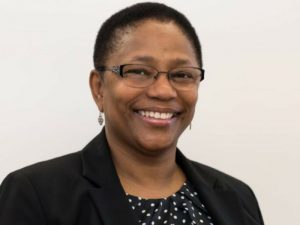
Executive Director Jacqueline M. Banks
“No one should be subjected to unwanted or unwelcomed sexual advances anywhere — especially not their place of work,” said Commissioner of the Department Consumer Affairs, Lorelei Salas. “This ad campaign shines a light on the many excuses used by those who prey on the vulnerability of others, calling out their behavior for what it really is — sexual harassment. I want to remind New Yorkers that the City’s Human Rights Law applies to all workers, including independent contractors, interns, and volunteers — and that our Office of Labor Policy & Standards (OLPS) is here to protect your rights as a worker. If you are the victim of sexual or gender-based harassment, you do not need to live in fear of retaliation. You can file a complaint with the Commission or visit nyc.gov/dca to learn about your many workplace protections.”
“We will need to use every tool in the toolbox as we engage the public in a discussion about workplace sexual harassment and how to address this insidious behavior. It will be a long-term process as we work to promote a fundamental cultural shift in our society about what is acceptable behavior and what is not,” said Council Member Helen Rosenthal, Chair of the Committee on Women. “I am delighted at the news that the NYC Commission on Human Rights will be running an ad campaign about workplace harassment in city subways, bus shelters, taxis, local media, and other venues. Their campaign will reach huge swaths of our city — hopefully sparking many productive conversations and, even more importantly, alerting survivors that they are not alone. I want to thank the Commission for their tremendous leadership on this issue.”
“I want to commend the NYC Commission on Human Rights for their efforts to combat sexual harassment in the workplace. As a society, we must do more to ensure that all employees feel comfortable in their work environments, and are not subjected to discriminatory behavior,” said Council Member Dr. Mathieu Eugene, Chair of the Committee on Civil Rights. “It is long overdue that we provide additional resources to those who have been victimized by this type of behavior. Today’s announcement is an important step in creating a safer workplace culture for future generations of New Yorkers.”

Margaret S. Chin
“In order to make sexual harassment a thing of the past, we need to end the shame that too often shadows victims of sexual violence,” said Council Member Margaret S. Chin, Co-Chair of the New York City Council Women’s Caucus. “Through this public outreach campaign, the NYC Commission on Human Rights will allow more survivors to report harassment, seek justice and encourage others to do the same. No victim of sexual harassment should have to suffer in silence, and I thank Mayor de Blasio, Commissioner Malalis and all the advocates for creating safe spaces and programs that will empower more survivors to fight back.”
“New Yorkers deserve to have a space where they can feel safe to report incidents of sexual misconduct. If our city normalizes and de-stigmatizes the conversation around sexual harassment, making New Yorkers feel it’s okay to come forward, then we may be able to get more individuals to report the violations they encounter,” said Council Member Carlina Rivera, Co-chair of the NYC Council’s Women’s Caucus. “A public education campaign put forth by the NYC Commission on Human Rights is just what we need to encourage people to speak their truths.”
“Abuse thrives most in the shadows and the Commission’s campaign is a crucial contribution to continuing to throw light on a pervasive social problem that undermines the dignity and potential of women every day,” said Commissioner at the NYC Commission on Human Rights and Co-founder and Director of the National Economic and Social Rights Initiative, Cathy Albisa. “I applaud the Commission for launching this campaign and its continued work empowering and protecting women across the City.”
“The Commission’s campaign is a powerful step to help break down a culture of innocence that has developed, whereby those who act out and perpetuate sexual harassment do so without knowing their actual place in a larger, cultural subjugation,” said Commissioner at the NYC Commission on Human Rights and Healthcare and Management Consultant, Carrie Davis. “More importantly, these persons often do so without understanding the extent of the damage they do, and how they are acting as proxies for more powerful interests that stand to gain the most from maintaining sexual and gender-based oppression. These acts are a violent contamination of the true spirit of New York City.”
“So many of us have said ‘Me Too’ but so many working women continue to not be protected from sexual violence. For domestic workers, there’s often no typical HR department where you can file a complaint,” said New York Director of the National Domestic Workers Alliance, Irene Jor. “That is why this New York City ad campaign comes at an important moment. As more working women come forward and say #MeToo, it’s critical to have multilingual and publicly available information that helps survivors know their rights and get the justice they deserve.”
“As a global movement to end harassment, Hollaback! is thrilled to see the new outreach campaign of NYC Commission on Human Rights,” said Executive Director of Hollaback!, Emily May.
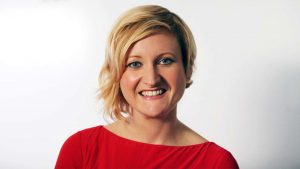
Emily May, Hollaback! Executive Director
“These ads honor the experience of a person who’s been harassed, to show that there are no excuses for workplace sexual harassment — whether it’s in an office, online, or in the streets. Taking the problem seriously is crucial to help reduce trauma, fix a harmful environment, and encourage active bystander intervention.”
“Research shows that LGBTQ people face sexual harassment and violence at the same, or higher, rates than non-LGBTQ people. New Yorkers of varying genders and sexualities are survivors of sexual violence, often times falling victim to said violence due to their identities,” said Executive Director at New York City Anti-Violence Project, Bev Tillery. “The New York City Anti-Violence Project is proud of the work the NYC Commission on Human Rights has done on raising awareness while also providing necessary resources. The Commission’s work through media campaigns, including their 2016 trans and gender non-conforming affirming bathroom campaign, has been influential in making LGBTQ New Yorkers feel seen and safe in this city. This new ad campaign continues this vital work.”
“Sexual harassment is a pervasive problem in New York City’s fashion and modeling industries,” said Founding Director of the Model Alliance, Sara Ziff. “Surprise nude shoots are common and young models, who are often mere teenagers, are sometimes pressured to provide sexual favors to adults, including agents and photographers who control their professional destinies. In December, my peers and I testified before the Commission about our experiences and we offered our recommendations for change. As a model and labor rights advocate, I am grateful for the Commission’s efforts and I am hopeful that the City will continue to work with the Model Alliance to put an end to these abuses. Everyone who works for a living deserves to be treated with dignity and respect on the job.”
Edited by Greggory W. Morris
